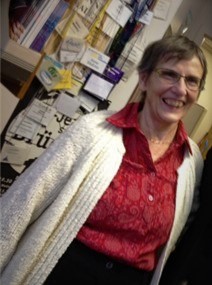Tribute to Dr. Anne Malena on her Retirement
A. Malena - 12 May 2021
Dr. Anne Malena. Photo by E. Siemens
Biography
I grew up in Switzerland, came to Canada in 1970, obtained my PhD from Cornell University in 1996 and arrived at the University of Alberta in September of that same year. Hard to believe that it has been 25 years! The department at that time had undergone a traumatic process of merging and was called Modern Languages & Comparative Studies. During my first year I participated in the divorce of this unit as the department became what it is today. I have enjoyed focusing primarily on translation over the years and advancing my research on Caribbean literature, eventually combining both fields into documenting the history of translation in Louisiana, a huge project that I am still working on. I was lucky to be able to teach in both areas, to create the Undergraduate MLCS Certificate in Translation Studies, and to supervise many students at the Honours, Master, and Doctoral levels, at times venturing into new and exciting areas and languages with the collaboration of co-supervisors—Polish, Russian, Italian, Japanese, German, Acadian French, Old French, Rumanian, Spanish, and Mandarin. A few years ago, I was offered a position at the Université d’Ottawa but preferred to stay here despite the series of crises affecting the department because I would have sorely missed this multilingual and multidisciplinary environment. I feel that I have made the right decision at the right time: to retire during yet another crisis, probably the worst ever, and I hope that my younger colleagues will be able to hang on and even flourish in the new structure. I am grateful for the time I have spent in MLCS and to those colleagues, past and present, who have accompanied me on this journey.
What has been your favourite class to teach over the years and why?
I have enjoyed teaching every course I chose or was assigned to me. Students have taught me as much as I taught them and helped me keeping in touch with their own cultures and experiences. I have not taught my very favourite course for a few years now: MLCS 600 (Translation Theories) and I miss it because I very much enjoyed the intersection between translation and literary theories and the different backgrounds, languages, and ideas that students brought to the class. It was exciting to find out about their own individual research projects and this course anticipated some of the principles that we have used to create the current transnational and comparative literature stream, which I hope will make translation one of its integral components and continue to attract excellent students.
What advice would you give to an Assistant Professor just beginning his/her life in academia?
Lately this has become a very difficult question to respond to and my natural skepticism leads me to wonder whether the job market will survive this ongoing corporative model for universities and whether my advice will be of any use. I have given a lot of advice over the years and have tried to provide tools of resistance to the students I interact with. In a nutshell I would advise a new Assistant Professor to take a careful look at the three areas of duty she must perform to survive. Research must take precedence over teaching and administration. Depending on her interests and temperament she must learn early on to say no to tasks that may prevent her from completing research projects. She should trust that her teaching will be good enough or she would not have been hired and that there will be time enough to get more involved in administration, if she does not ruffle feathers of colleagues who may be able to help her. But above all I would strongly recommend that work, even in the best profession that is ours, should not take over our life, and that it is very important to make time for other enjoyable activities.
What are you most looking forward to in retirement?
I am looking forward to having time! I will continue to work on my research and enjoy being able to read entire books from cover to cover, not just the introduction, the conclusion, and the index! I will also continue supervising a few students until they complete their degrees, organize, and attend conferences, at least this year. I will not retire from intellectual life in other words, as I am not able to see how that would ever be possible. Travel, of course, has always been part of my plans but with this new Covid reality I will simply have to wait and see.
